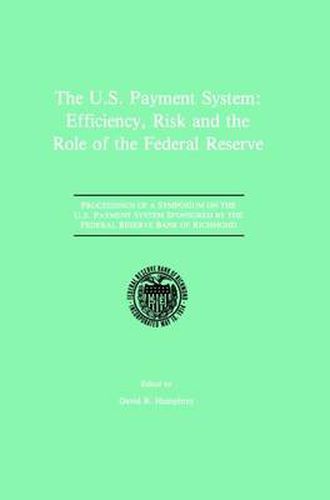Readings Newsletter
Become a Readings Member to make your shopping experience even easier.
Sign in or sign up for free!
You’re not far away from qualifying for FREE standard shipping within Australia
You’ve qualified for FREE standard shipping within Australia
The cart is loading…






This title is printed to order. This book may have been self-published. If so, we cannot guarantee the quality of the content. In the main most books will have gone through the editing process however some may not. We therefore suggest that you be aware of this before ordering this book. If in doubt check either the author or publisher’s details as we are unable to accept any returns unless they are faulty. Please contact us if you have any questions.
The U.S. payment system is in the midst of a significant transition. Some of the changes to our payment system, involving its efficiency, the risks inherent in the payment process, and the role of the private and public sectors in the payment mechanism, are the subject of considerable debate and controversy. In recent years, the Federal Reserve Bank of Richmond has played an active part in the development and implementation of policies to improve the payment process. The Bank’s operations staff has represented the Federal Reserve System in work with the banking industry to help shape and implement programs to increase efficiency and reduce payment risk. Further, our Research Department has made payment system research an important part of its agenda. The mix of practical experience and research has resulted in a unique perspective on payment system issues that led us to organize a symposium on the U.S. payment system, held on May 25-26, 1988, in Williamsburg, Virginia. Reflecting our belief in the importance of combining both practical experience and theory in addressing payment issues, we invited practi tioners, scholars, and policymakers to share their ideas. The symposium provided an opportunity for those researchers who are studying p- xi PREFACE xii ment issues to present their ideas and to have these ideas evaluated by experienced practitioners.
$9.00 standard shipping within Australia
FREE standard shipping within Australia for orders over $100.00
Express & International shipping calculated at checkout
This title is printed to order. This book may have been self-published. If so, we cannot guarantee the quality of the content. In the main most books will have gone through the editing process however some may not. We therefore suggest that you be aware of this before ordering this book. If in doubt check either the author or publisher’s details as we are unable to accept any returns unless they are faulty. Please contact us if you have any questions.
The U.S. payment system is in the midst of a significant transition. Some of the changes to our payment system, involving its efficiency, the risks inherent in the payment process, and the role of the private and public sectors in the payment mechanism, are the subject of considerable debate and controversy. In recent years, the Federal Reserve Bank of Richmond has played an active part in the development and implementation of policies to improve the payment process. The Bank’s operations staff has represented the Federal Reserve System in work with the banking industry to help shape and implement programs to increase efficiency and reduce payment risk. Further, our Research Department has made payment system research an important part of its agenda. The mix of practical experience and research has resulted in a unique perspective on payment system issues that led us to organize a symposium on the U.S. payment system, held on May 25-26, 1988, in Williamsburg, Virginia. Reflecting our belief in the importance of combining both practical experience and theory in addressing payment issues, we invited practi tioners, scholars, and policymakers to share their ideas. The symposium provided an opportunity for those researchers who are studying p- xi PREFACE xii ment issues to present their ideas and to have these ideas evaluated by experienced practitioners.